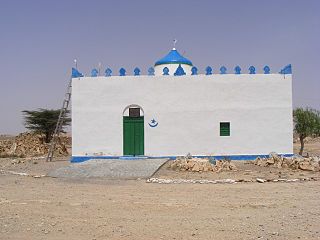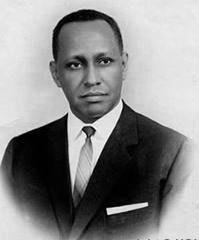Related Research Articles

The Djiboutian Music refers to the musical styles, techniques and sounds of Djibouti. The first major form of modern Djiboutian music began in the mid-1940s, when Djibouti was a part of the French Somaliland. Djiboutian music is characterized by poetry, so that listening to a Djiboutian song is first paying attention to its meaning. The artist rocks the listeners in the cheerfulness of the refrains and the turn of the sentences. Often sung by a couple, a song is played in the form of a sleight of hand between a man and a woman, one recounting his feelings and his love, even his passion for the other, until the other accepts or rejects this offer.

The culture of Somalia is an amalgamation of traditions in that were developed independently since the Proto-Somali era. The hypernym of the term Somali from a geopolitical sense is Horner and from an ethnic sense, it is Cushite.

The Isaaq is a major Somali clan family. It is one of the largest Somali clan families in the Horn of Africa, with a large and densely populated traditional territory.

The Darod is a Somali clan. The forefather of this clan is Sheikh Abdirahman bin Isma'il al-Jabarti, more commonly known as Darod. The clan primarily settles the apex of the Horn of Africa and its peripheries, the Somali hinterlands adjacent to Oromia (Ogaden), and both sides of the Kenya–

The Marehan is a Somali clan, which is part of one of the largest Somali clan families, the Darod.
The Ogaden is one of the major Somali clans.

Muḥammad ibn 'Abdallāh Hassan was a Somali religious, political, and military leader who founded and headed the Dervish movement, which led a Holy war against British, Italian, and Ethiopian intrusions in the Horn of Africa. He was famously known by the British Empire as the Mad Mullah. In 1917, the Ottoman Empire referred to Hassan as the "Emir of the Somali". Due to his successful completion of the Hajj to Mecca, his complete memorization of the Quran and his purported descent from the Islamic prophet Muhammad, his name is sometimes preluded with honorifics such as Hajji, Hafiz, Emir or Sayyid. His influence led him to being regarded as the “Father of Somali nationalism”.

The Habar Gidir is a major subclan of the Hawiye. The clan has produced some prominent Somali figures, including the first Prime Minister of Somalia Abdullahi Issa Mohamud, and Somalia's fifth President Abdiqasim Salad Hassan.
Over the course of the Somali Civil War, there have been many revolutionary movements and militia groups run by competing rebel leaders which have held de facto control over vast areas within Somalia.

Somali literature is the literature used by the ethnic Somalis of Somalia, Somaliland, Djibouti, Yemen, Eritrea, Ogadenia, and Kenya.
The Bravanese people, also known as the Barawani, are a minority ethnic group inhabiting the city of Barawe of Somalia.
Balwo is a style of music and poetry practiced in Somalia as well as Djibouti. Its lyrical contents often deal with love and passion. The Balwo genre was founded by Abdi Sinimo.
Sheekh Ahmed Gabyow was a famous Somali poet and warrior mullah from the Abgaal Hawiye clan. Gabyow lived in the coastal areas north of Mogadishu in the first few decades of the Italian occupation. He was well known for the masafo reciting and producing several dozen as a genre of Somali poetry that is usually composed by religious men.

The literature of Djibouti has a longstanding poetic tradition. Several well-developed Somali forms of verse include the gabay, jiifto, geeraar, wiglo, buraanbur, beercade, afarey and guuraw. The gabay has the most complex length and meter, often exceeding 100 lines. It is considered the mark of poetic attainment when a young poet is able to compose such verse, and is considered the height of poetry. Groups of memorizers and reciters (hafidayaal) traditionally propagated the well-developed art form. Poems revolve around several main themes, including baroorodiiq (elegy), amaan (praise), jacayl (romance), guhaadin (diatribe), digasho (gloating) and guubaabo (guidance). The baroorodiiq is composed to commemorate the death of a prominent poet or figure. The Afar are familiar with the ginnili, a kind of warrior-poet and diviner, and have a rich oral tradition of folk stories. They also have an extensive repertoire of battle songs.

Dhaanto is a style of traditional Somali music and folk dance. It is a cultural folk dance native to Somali people in the Horn of Africa.
Elmi Boodhari was a Somali poet and pioneer in the genre of Somali love poems. He is known among Somalis as the King of Romance. He was born near the border between Ethiopia and Somaliland in 1908 and hailed from the Eidagale sub-clan.
Amran Mohamed Ahmed is a Somali author, poet and journalist who was selected by the Finnish Refugee Council as "Refugee Woman of the Year" in 2005.

Salaan Mahamud Hirsi, better known as Salaan Carrabey, was a famous poet from the Adan Madoba sub-division of the Habr Je'lo Isaaq clan.
Farah Nur was a famed Somali poet and warrior of the Arap Isaaq clan.
The Sa'ad Musa or Saad Musa is a northern Somali clan. Its members form a part of the Habr Awal sub-clan of the Isaaq clan family. The Sa'ad Musa traditionally consists of nomadic pastoralists, coastal people, merchants and farmers. The clan inhabits Somaliland, including Maroodi Jeex, and Sahil as well as Djibouti, the Somali Region of Ethiopia, Kenya and Tanzania.
References
- ↑ "Wararka Maanta: Jimco, Apr 26, 2013-Abwaan C/laahi Macalin Axmed Dhoodaan oo Saaka ku Geeriyoodey Magaalada Herer ee Dalka Itoobiya". Hiraan Online (in Somali). April 26, 2013. Retrieved 26 December 2013.
- ↑ "Wariyaha VOA Laanteeda afka Soomaaliga ee Kenya, Maxamad Faarax Shire, ahna tifatiraha warsidaha caanka ah ee www.afdheer.com ayaa wareysitay Abwaanka Stanza" . Retrieved 27 December 2014.
{Somali-writer-stub}}